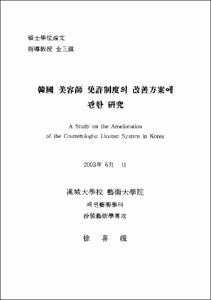韓國 美容師 免許制度의 改善方案에 관한 硏究
= (A) study on the amelioration of the cosmetologist license system in Korea
- Type
- Thesis
- Department
- 扮裝藝術學專攻
- Issued Date
- 2003
- Publisher
- 漢城大學校 藝術大學院
- Keyword
- 미용사면허제도; 미용사 면허종목; 한국보건의료인국가시험원
- Files in This Item:
-
-
Download
 000000066499.pdf
기타 데이터 / 5.44 MB / Adobe PDF
000000066499.pdf
기타 데이터 / 5.44 MB / Adobe PDF
-
Items in Repository are protected by copyright, with all rights reserved, unless otherwise indicated.